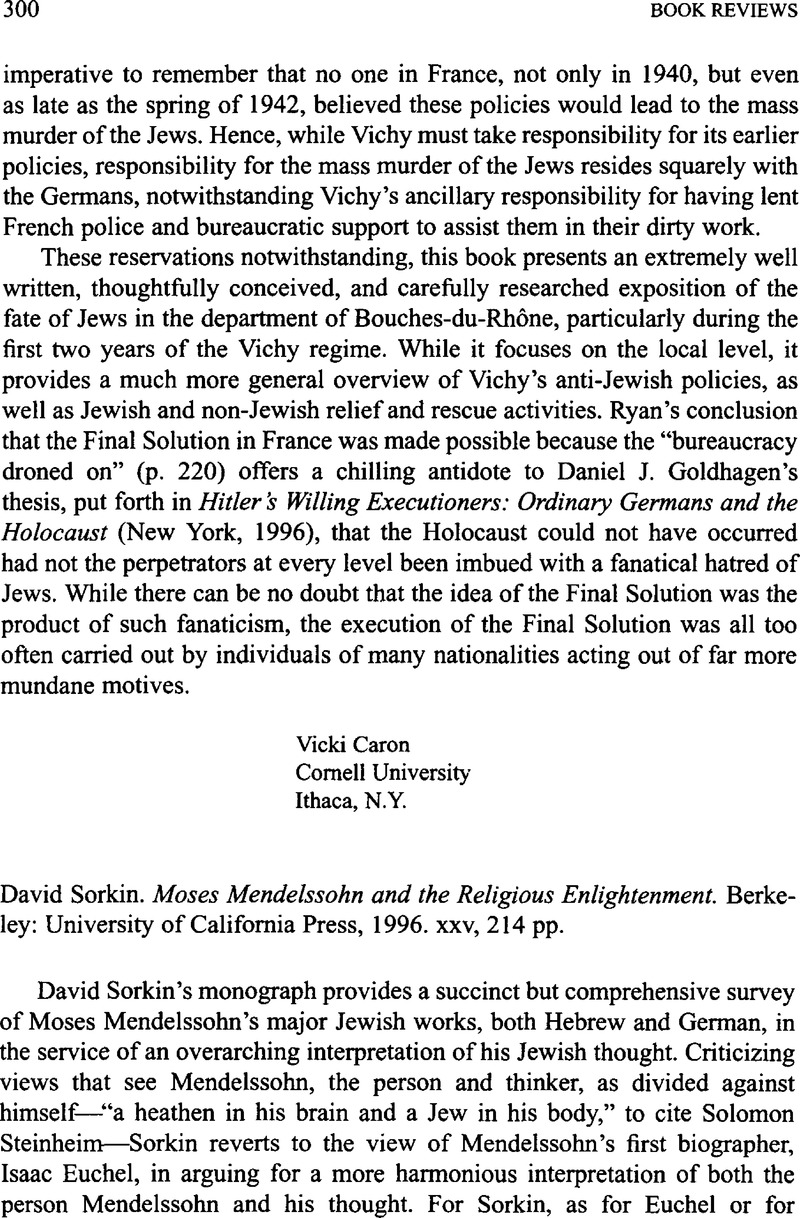Published online by Cambridge University Press: 15 October 2009

1. “From Context to Comparison: The German Haskalah and Reform Catholicism,” Tel Aviver Jahrbuch für deutsche Geschichte 20 (1991): 23–58; and “The Case for Comparison: Moses Mendelssohn and the Religious Enlightenment,” Modern Judaism 14 (1994): 121–138.
2. Mendelssohn characterizes Halevi's explanation as bilti mspkt. It would appear that Sorkin vocalized mspkt as mes upeket, in which case Mendelssohn is saying that Halevi's explanation is indubitable. In truth, as the context makes perfectly clear, mspkt should be vocalized as maspeket, that is, according to Mendelssohn, Halevi's explanation is inadequate.
3. The comment on Genesis 11:5 is by Mendelssohn's collaborator, Solomon Dubno.
4. See Gillon, Meir, Kohelet Mussar le-Mendelssohn 'al Reka Tekufato (Jerusalem, 1979), p. 129.Google Scholar
5. For a translation of the letter, seeAltmann, Alexander, Moses Mendelssohn: A Biographical Study (University, Ala., 1973), p. 275. Given Mendelssohn's staunch and unbending affirmation of the reliability of the Masoretic text of the Pentateuch, one wonders if, in his comment here about possible textual corruptions, Mendelssohn may have been tacitly anticipating the position of Shadal, who defended the reliability of only the Pentateuchal Masoretic text, to the exclusion of the Masoretic text of the rest of Scripture.Google Scholar
6. Compare Sorkin's inadequate discussion of this important letter with the insightful analyses to be found in Altmann, Moses Mendelssohn, pp. 255–256; and Arkush, Allan, Moses Mendelssohn and the Enlightenment (Albany, N.Y., 1994), pp. 204–207. While more, in my view, still remains to be said about this letter, at least Altmann and Arkush have asked the right questions. (Full translations of the letter are to be found in both Altmann and Arkush.)Google Scholar
7. Thus the only comments from the Biur that Sorkin identifies as being derived from the medieval commentaries are those explicitly identified as such in the Biur itself.
8. Why some of the comments in the Biur taken from the medieval commentaries are so identified while others taken from the same commentaries are not so identified requires further examination.
9. See, in this connection, the incisive observations ofBreuer, Edward in his important new work, The Limits of Enlightenment: Jews, Germans, and the Eighteenth-Century Study of Scripture (Cambridge, Mass., 1996), pp. 182–183.Google Scholar